Samaaro + Your CRM: Zero Integration Fee for Annual Sign-Ups Until 30 June, 2025
- 00Days
- 00Hrs
- 00Min
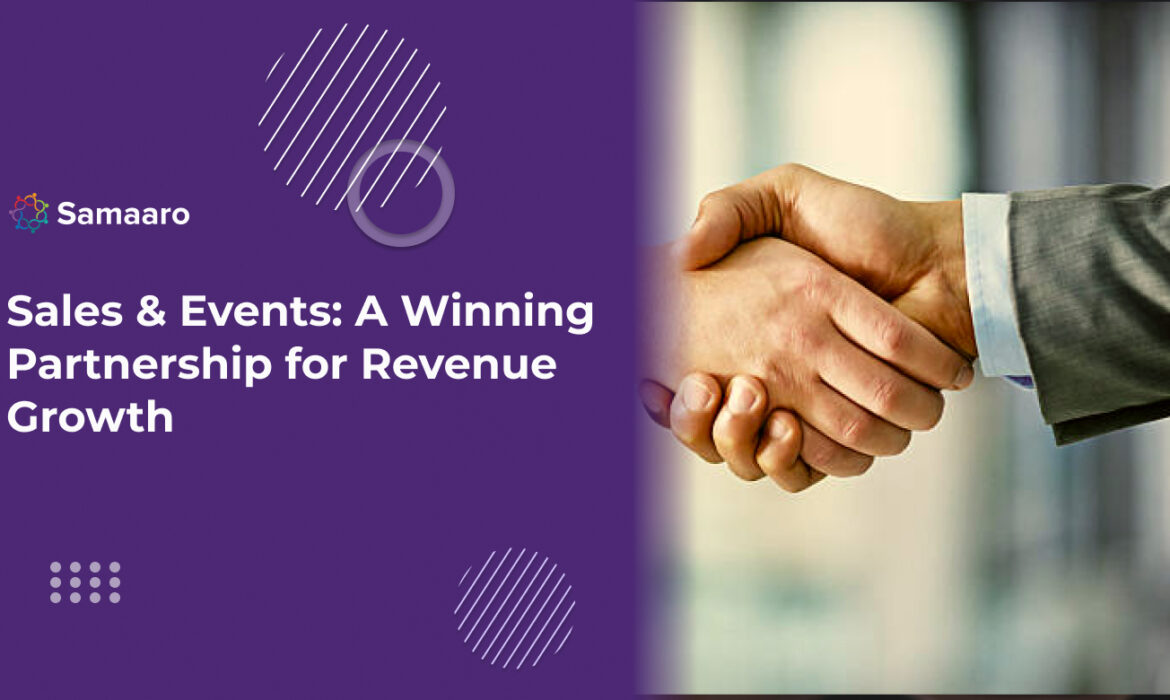
Traditionally, sales and event teams have operated in silos, with minimal collaboration beyond sponsorships or lead generation. However, in today’s competitive landscape, integrating sales into the event planning and execution process can drive significant revenue growth and enhance attendee experiences.
By aligning goals, improving communication, and leveraging each team’s expertise, organizations can maximize event ROI, improve customer relationships, and create high-impact experiences. In this blog, we’ll explore how breaking down silos, integrating sales into event planning, and optimizing sponsorships can transform your event strategy into a revenue-generating powerhouse.
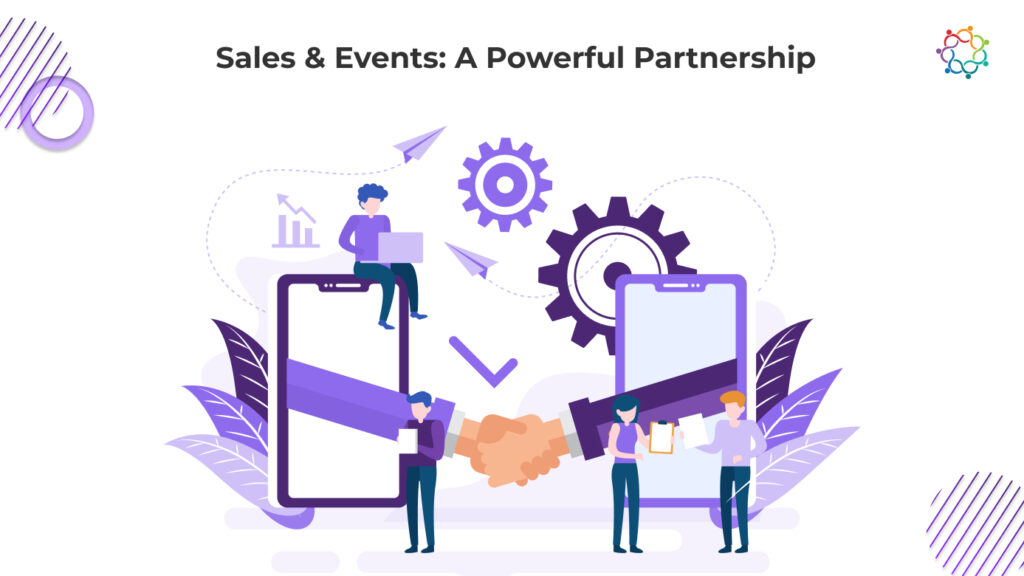
In many organizations, sales and event teams operate in silos, with separate objectives, tools, and strategies. However, true event success comes when these teams collaborate, aligning their efforts to create a seamless, engaging experience that drives meaningful business outcomes. By fostering open communication, shared goals, and cross-functional teamwork, companies can maximize the value of their events and create stronger connections with their audiences.
To work effectively together, sales and event teams need a unified vision. Instead of viewing events as isolated marketing activities, both teams should align around key objectives such as:
When both teams align on these core objectives, events transform from standalone initiatives into powerful business growth drivers.
One of the biggest challenges in collaboration is miscommunication. Sales and event teams often operate with different timelines, tools, and priorities, leading to missed opportunities. Establishing clear communication channels ensures that both teams:
By streamlining communication, sales and event teams can eliminate confusion and work together more efficiently.
Rather than operating as separate entities, companies can foster collaboration by forming cross-functional teams that include members from both sales and event departments. This approach:
By integrating team members into a unified working group, companies can break down silos and foster a more cohesive approach to event execution.
When sales and event teams collaborate effectively, the customer experience becomes more personalized, seamless, and impactful. A well-coordinated approach ensures that:
This level of coordination creates a frictionless journey for attendees, increasing the likelihood of meaningful connections and long-term relationships.
Collaboration also enables better measurement and optimization of event performance. When sales and event teams work together, they can:
With a collaborative mindset, sales and event teams can not only drive stronger event results but also refine their strategies for long-term success.
Breaking down silos between sales and event teams isn’t just about improving efficiency—it’s about creating more meaningful, impactful event experiences that drive real business value. By aligning goals, improving communication, fostering cross-functional teamwork, and delivering seamless customer interactions, companies can unlock the full potential of their events. When sales and event teams work together as true partners, the result is stronger relationships, higher engagement, and measurable success.
For events to drive real business impact, sales teams must be involved from the very beginning. Their deep understanding of customer needs, industry trends, and revenue goals makes them invaluable in shaping event strategy. By integrating sales into event planning, organizations can ensure their events are not just engaging experiences but also effective revenue-generating opportunities.
Bringing sales teams into the event planning process early allows for a more strategic approach. Sales teams can provide insights on:
By collaborating from the start, event planners and sales teams can create events that resonate with attendees and drive meaningful conversations.
Sales teams have a wealth of information about customers and prospects, including their needs, preferences, and buying behaviors. Leveraging this data allows event organizers to:
A data-driven approach ensures that attendees get maximum value from the event, increasing engagement and brand affinity.
Sales teams have established relationships with key industry players, making them valuable partners in securing event sponsorships. They can help:
A strong sponsorship strategy enhances event funding, resources, and overall experience for attendees.
A well-defined lead generation strategy requires close collaboration between sales, marketing, and event teams. Together, they can:
This structured approach ensures that leads gathered at the event translate into real business opportunities.
Events are prime opportunities for direct engagement with prospects. Sales teams can drive meaningful interactions through:
By integrating sales activation opportunities into the event, organizations can drive immediate and long-term revenue growth.
The success of an event isn’t just measured by attendance—it’s measured by post-event conversions. To ensure effective follow-up, sales and event teams should:
A strong post-event strategy ensures that leads don’t go cold and that events contribute directly to business growth.
Even the best event strategy falls flat without an empowered sales team. Organizations must equip their sales teams with the right tools, knowledge, and support to maximize event-generated opportunities.
Sales reps need to be well-versed in event themes, product offerings, and key messaging to engage attendees effectively. Pre-event training should cover:
Well-prepared sales teams can confidently navigate event conversations and position solutions effectively.
Sales teams need engaging, informative content to support their conversations. Essential sales collateral includes:
Having readily available sales materials ensures reps can provide valuable information on the spot.
Seamless CRM integration is crucial for tracking and managing event-generated leads. Best practices include:
With an integrated system, sales teams can efficiently nurture and convert leads without manual data entry delays.
Providing on-site support enhances sales effectiveness during events. Organizations should offer:
These resources ensure that sales teams can make the most of every interaction.
To continuously improve event-driven sales efforts, tracking key performance metrics is essential. Organizations should monitor:
By analyzing these insights, sales and event teams can refine strategies for future events, ensuring continued success.
Integrating sales into the event planning process and providing the right enablement tools transforms events from simple brand awareness activities into powerful revenue-driving opportunities. When sales teams are involved from the start, equipped with the right resources, and supported with seamless lead management, events become a catalyst for business growth. The key to success lies in collaboration, strategic planning, and continuous optimization—ensuring that every event delivers tangible results.
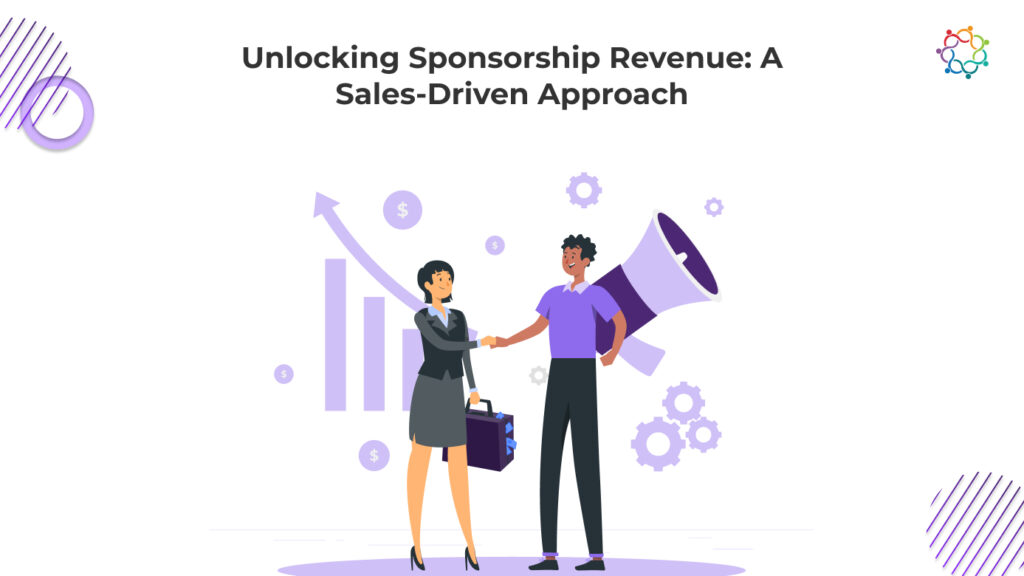
Sponsorships are a critical revenue stream for events, providing financial support while offering sponsors valuable brand exposure and lead generation opportunities. To maximize sponsorship success, sales teams must take a strategic approach to identifying, securing, and managing partnerships.
Sales teams have deep relationships within the industry, making them well-positioned to:
A targeted approach ensures that sponsorship opportunities align with attendee interests, maximizing value for all parties.
A one-size-fits-all approach to sponsorships no longer works. Sales and event teams should collaborate to create tailored sponsorship packages that offer:
By designing diverse sponsorship packages, organizers can appeal to a broader range of sponsors while enhancing the event experience for attendees.
Sales teams play a key role in structuring sponsorship agreements that are beneficial for both sponsors and event organizers. Key considerations include:
A well-negotiated sponsorship agreement leads to long-term partnerships and repeat sponsorships for future events.
Sponsorship success goes beyond securing deals—it requires ongoing relationship management. Best practices include:
Maintaining strong sponsor relationships leads to higher retention rates and increased sponsorship revenue over time.
Measuring Sponsorship ROI: Demonstrating Value to Secure Future Deals
To ensure continued sponsorship success, it’s crucial to track and report on key performance indicators, such as:
Providing sponsors with detailed post-event reports showcasing their impact helps secure renewals and expand sponsorship opportunities in future events.
A successful event isn’t just about attendance—it’s about the tangible business outcomes it delivers. Sales teams and event organizers must track key metrics to assess event effectiveness and optimize future strategies.
To measure the effectiveness of sales-driven event strategies, organizations should monitor:
These insights help sales teams refine their engagement strategies and prioritize high-value opportunities.
Event ROI isn’t just about revenue—it’s about efficiency and impact. Businesses should evaluate:
A data-driven approach ensures that events remain a profitable and strategic investment.
Continuous improvement requires feedback from multiple sources:
By leveraging feedback, organizations can refine event strategies and enhance sales effectiveness for future engagements.
Using Data to Optimize Strategies: Driving Continuous Improvement
Post-event analysis shouldn’t just be a review—it should drive actionable changes. Businesses can use event and sales data to:
Continuous optimization ensures that each event builds upon past successes, delivering greater value to attendees, sponsors, and sales teams.
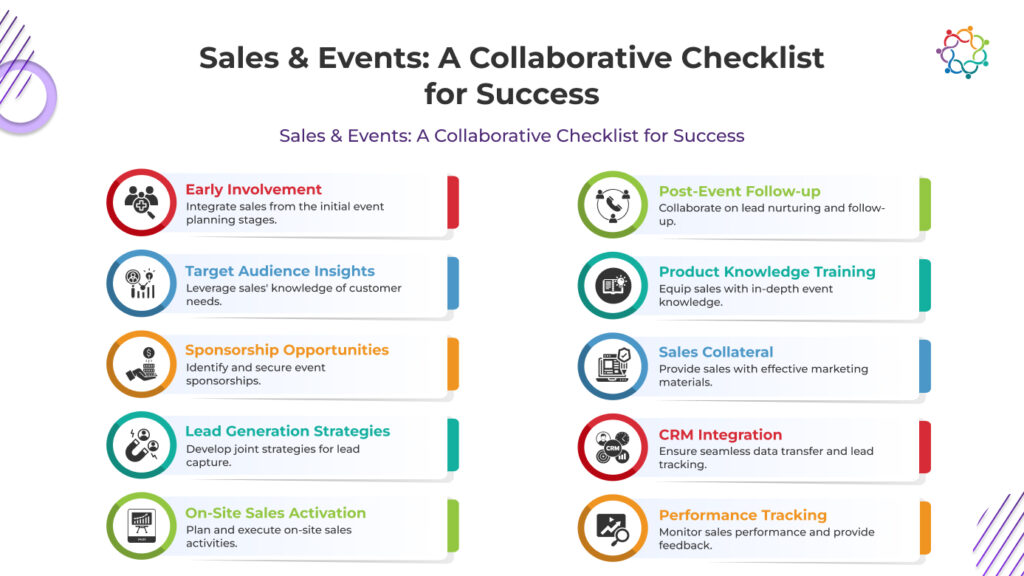
The synergy between sales and events is essential for maximizing business impact. By breaking down silos, integrating sales into event planning, and leveraging sponsorship opportunities strategically, organizations can transform events into powerful revenue-generating platforms.
A strategic and data-driven approach ensures that events generate not only leads but also long-term customer relationships and measurable business growth. Implementing these strategies with a platform like Samaaro can streamline processes, improve sales alignment, and maximize event ROI.
Book a demo or start your free trial today to see how Samaaro can help you turn your events into revenue-driving opportunities.

Built for modern marketing teams, Samaaro’s AI-powered event-tech platform helps you run events more efficiently, reduce manual work, engage attendees, capture qualified leads and gain real-time visibility into your events’ performance.
Location
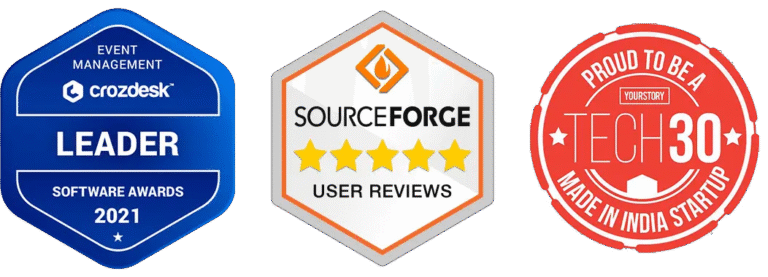
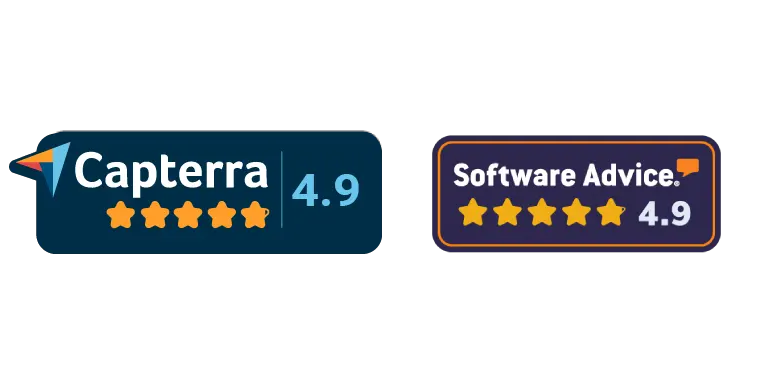
© 2026 — Samaaro. All Rights Reserved.